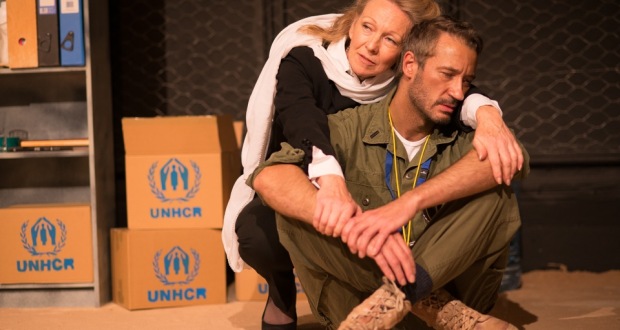Pros: A soul-searching and often profound investigation into the rights and duties of humanitarian aid workers faced with impossible odds in an unfriendly environment.
Cons: Underpowered direction and a script with little action make this a hard slog through waves of sandy rhetoric. Running a refugee camp the size of Lincoln can't be an easy task – but then nobody expects it to be. Rhetoric and polemic can't mask the lack of plot.
Summary
Rating
Poor
And so Moriarty becomes first the builder, then the administrator, of a vast refugee camp somewhere in the Middle East. By the second scene the camp has grown to 125,000 people, bigger than ‘Lincoln, Exeter or Colchester’, we’re frequently reminded. Moriarty has acquired the title Lord Mayor, and he struggles to reconcile his duty to carry out the wishes of his Swiss taskmasters with the realities of the makeshift town he has to run.
Moriarty’s main problems are with Colonel al-Sawadi, who rules one of the township’s districts – although ‘he’s only a Lieutenant Colonel,’ Moriarty takes pains to point out. The Colonel demands caravans and private sanitation facilities for his people, while appropriating the best for himself. Stanton, the Communications Officer, is aghast at the corruption he sees in the camp and blames Moriarty for his lack of leadership. When Sabeen, a 14-year-old refugee (played by Balquis Duvall, giving the best performance of the night) offers to become his translator and go-between, Stanton also blames Moriarty for refusing to accede to the request.
Moriarty’s role is that of a pragmatist, caught between his regional director from Geneva and an investigative journalist with an eye for a scandal, both of whom become the object of his erotic fantasies. This pragmatism is the heart of the play: how is Moriarty to balance the multiple demands made on him, and how is he to reconcile the theory of humanitarianism with the actuality of working with a town full of people who want to lead as normal a life as possible?
The play confronts the situation full-on, with plenty of loaded rhetoric: ‘You’re playing God.’ ‘When he doesn’t turn up, somebody has to.’ The rhetoric is sometimes heavy-handed; when Moriarty describes the refugee camp as ‘a warehouse of dreams’, the Colonel replies: ‘I dream of beheading my enemies.’
The trouble is that for all the talk (and there’s plenty of it), there’s just not enough drama. In the entire 90 minutes nothing actually happens, although we hear occasional riots from off-stage. We hear of stolen electricity being sold on to the refugees, and of a toilet caravan being stolen and sold, but we see none of it for ourselves. There’s very nearly a reported dramatic incident involving Stanton and Sabeen – the only character with any real personality – but it’s all resolved within the space of a scene and the status quo remains intact.
Part of the problem is that the character of Moriarty isn’t brutal enough. He needs to be a ruthless, single-minded leader, but he’s played as weak incumbent who’s out of his depth. A snappier direction could have given the play more pace, but ultimately the lack of on-stage action (and off-stage consequences) makes this a worthy but polemical evening.
Author: Chuck Anderson
Director: Dan Phillips
Booking Until: 6 December 2014
Box Office: 08444 771 000
Booking Link:
 Everything Theatre Reviews, interviews and news for theatre lovers, London and beyond
Everything Theatre Reviews, interviews and news for theatre lovers, London and beyond



